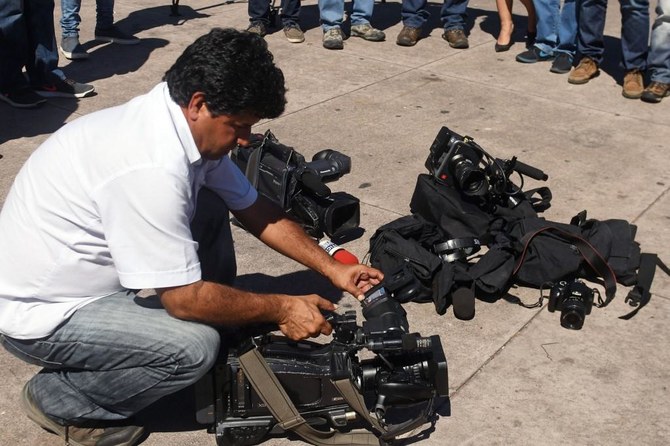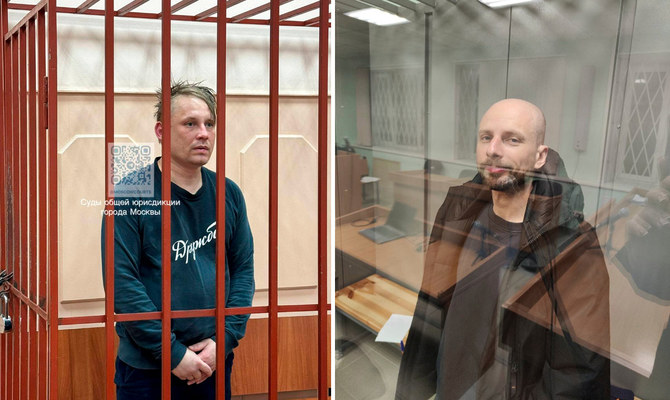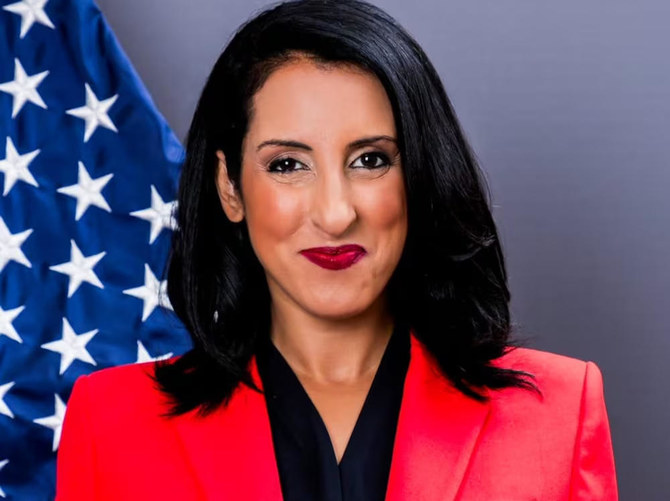SAN SALVADOR: The cell phones of nearly three dozen journalists and activists in El Salvador, several of whom were investigating alleged state corruption, have been hacked since mid-2020 and implanted with sophisticated spyware typically available only to governments and law enforcement, a Canadian research institute said it has found.
The alleged hacks, which came amid an increasingly hostile environment in El Salvador for media and rights organizations under populist President Nayib Bukele, were discovered late last year by The Citizen Lab, which studies spyware at the University of Toronto’s Munk School of Global Affairs. Human-rights group Amnesty International, which collaborated with Citizen Lab on the investigation, says it later confirmed a sample of Citizen Lab’s findings through its own technology arm.
Citizen Lab said it found evidence of incursions on the phones that occurred between July 2020 and November 2021. It said it could not identify who was responsible for deploying the Israeli-designed spyware. Known as Pegasus, the software has been purchased by state actors worldwide, some of whom have used the tool to surveil journalists.
In the El Salvador attack, the heavy focus on editors, reporters and activists working inside that single Central American country points to a local customer with a particular interest in their activities, said Scott-Railton, a senior researcher at Citizen Lab.
“I can’t think of a case where near-exclusive Pegasus targeting in one country didn’t wind up being a user in that country,” Scott-Railton said.
Citizen Lab released a report https://citizenlab.ca/2022/01/project-torogoz-extensive-hacking-media-ci... on its findings on Wednesday.
In a statement to Reuters, Bukele’s communications office said the government of El Salvador was not a client of NSO Group Technologies, the company that developed Pegasus. It said the administration is investigating the alleged hacking and had information that some top administration officials also might have had their phones infiltrated.
“We have indications that we, government officials, are also victims of attacks,” the statement said.
Pegasus allows users to steal encrypted messages, photos, contacts, documents and other sensitive information from infected phones without users’ knowledge. It can also turn handsets into eavesdropping devices by silently activating their cameras and microphones, according to product manuals reviewed by Reuters.
NSO, which has long kept its client list confidential, declined to comment on whether El Salvador was a Pegasus customer. The company said in a statement that it sells its products only to “vetted and legitimate” intelligence and law enforcement agencies to fight crime and that it is not involved in surveillance operations. NSO said it has a “zero-tolerance” policy for misuse of its spyware for activities such as monitoring dissidents, activists and journalists and that it has terminated contracts of some customers who have done so.
Citizen Lab researchers said they began a forensic analysis of the El Salvador phones in September after being contacted by two journalists there who suspected their devices might be compromised.
Researchers said they ultimately found evidence that spyware had been planted on a total of 37 devices belonging to three human-rights groups, six news publications and an independent journalist.
Hardest hit was the online news site El Faro. Citizen Lab researchers said they found telltale tracks of spyware infections on the cell phones of 22 reporters, editors and administrative personnel — more than two-thirds of the company’s staff — and evidence that data had been stolen from many of those devices, including a few that had several gigabytes of material extracted.
El Faro was under constant surveillance during at least 17 months, between June 29, 2020 and November 23, 2021, with the phone of Editor-in-Chief Oscar Martinez infiltrated at least 42 times, Citizen Lab claimed.
“It is hard for me to think or conclude something other than the government of El Salvador” was behind the alleged hacks, Martinez said. “It’s evident that there is a radical interest in understanding what El Faro is doing.”
During the time of the purported infiltrations with Pegasus, El Faro reported extensively on scandals involving Bukele’s government, including allegations that he was negotiating a financial deal with El Salvador’s violent street gangs to reduce the homicide rate to boost popular support for the president’s New Ideas party.
Bukele, who spars frequently with the press, publicly condemned El Faro’s reporting on those purported talks as “ridiculous” and “false information” in a September 3, 2020 Twitter post.
Phone snooping isn’t new to El Salvador, according to Citizen Lab. It alleged in a 2020 report that El Salvador was among at least 25 countries using a bulk surveillance technology made by an Israeli company called Circles. The Circles technology differs from Pegasus in that it vacuums up data from the global phone network instead of planting spyware on specific devices. The report claimed the Circles system had been in operation in El Salvador since 2017.
Circles could not immediately be reached for comment.
Sofia Medina, Bukele’s communications secretary, noted that his administration was not in power in 2017 and claimed, without providing evidence, that the alleged Pegasus attacks appeared to be a continuation of surveillance launched by an unknown “powerful group.”
Citizen Lab’s latest investigation in El Salvador was conducted as a collaboration with digital-rights group Access Now, with investigative assistance from human-rights groups Frontline Defenders, SocialTIC and Fundacion Acceso.
Salvadoran journalists’ phones hacked with spyware, report finds
https://arab.news/535nf
Salvadoran journalists’ phones hacked with spyware, report finds

- Report finds that nearly three dozen Salvadorian journalists had their phone hacked since mid-2020 and implanted by sophisticated spyware, aka Pegasus
RedBird IMI withdraws from Telegraph deal, to sell UK newspaper

- Abu Dhabi-backed investor group to sell media outlet following government ban on foreign entities owning national newspapers
- RedBird IMI says its focus is on securing the best price for the titles, but experts fear the asset could fecth a lower price than what was originally paid
LONDON: Abu Dhabi-backed RedBird IMI on Tuesday said it would sell the Telegraph after it scrapped its acquisition of the right-leaning newspaper group because government intervention meant the deal was “no longer feasible.”
RedBird IMI effectively took control of the Telegraph and the Spectator magazine in December when it repaid a debt owed by then-owner the Barclay family to Lloyds Bank, including a 600 million pound ($753 million) loan against the titles.
But the acquisition, which already faced a lengthy regulatory inquiry, was dealt a blow last month when Britain said it would stop foreign governments owning newspapers.
“RedBird IMI has today confirmed that it intends to withdraw from its proposed acquisition of the Telegraph Media Group and proceed with a sale,” a RedBird IMI spokesperson said.
“We have held constructive conversations with the government about ensuring a smooth and orderly sale for both titles.”
RedBird IMI, led by former CNN executive Jeff Zucker, is backed by Mansour bin Zayed Al Nahyan, a member of Abu Dhabi’s ruling family and the owner of Manchester City soccer club.
The government issued a notice in December stopping RedBird IMI transferring ownership of the newspaper or changing its management and board while it investigated the deal.
Culture Secretary Lucy Frazer said on Tuesday she would now allow RedBird IMI to conduct an orderly sale of the titles after it had signalled its intention to withdraw.
“Throughout this process I have raised concerns about the potential impact of this deal on free expression and accurate presentation of news, and I took steps to ensure that media freedom was protected while there was an investigation into those concerns,” she said.
RedBird IMI said its focus was on securing the best price for the titles, which are close to the ruling Conservatives.
Parties previously interested in the assets include hedge fund boss Paul Marshall, Daily Mail owner DMGT as well as private equity buyers.
Humanity at a turning point, Saudi minister tells WEF meeting in Riyadh

- Saudi Arabia wants to lead ‘intelligence revolution,’ Abdullah Al-Swaha, communications and information technology minister, says
- Industry leaders ‘must master AI within years or face irrelevance’
RIYADH: Humanity is at a turning point, pivoting from digital to artificial intelligence, and shifting from the industrial revolution to the intelligence revolution, a senior Saudi official told the special two-day World Economic Forum meeting in Riyadh.
“The world today is not at a tipping point but at a turning point in humanity, which means weare pivoting from digital to AI and maybe later on quantum,” Abdullah Al-Swaha, minister of communications and information technology, said.
Saudi Arabia is ready to embrace that shift, he added.
“The Kingdom is excited with its partnerships with countries and international organizations to carve a path toward inclusive AI adoption,” Al-Swaha told the panel.
“We are pushing today an inclusive agenda, that is innovative, and indisputably multistakeholder to make sure that we lead and leapfrog in this era.”
The Saudi minister noted that global economic output today is worth $100 trillion, of which $32 trillion is attributed to the labor force, and $1 trillion of that ‘is being augmented, accelerated and democratized by generated AI.’
“Over the next five to seven years, it is projected to go to 40 percent. That’s 43 percent of the labor force productivity. And this is why we are pivoting toward intelligence revolution,” Al-Swaha said.
He also cautioned that if “talents and leaders” did not master AI within six or seven years, “they will become irrelevant for any industry they are in.”
‘Saudi Arabia at forefront of AI,’ says business leader at World Economic Forum

- Saudi Arabia 'really a driver of not only the economy of the region, but also the economy of the world,' says global vice chair and chair of Europe, MENA at consulting firm AlixPartners
RIYADH: Saudi Arabia’s role in technology advancement is helping to drive not only the regional but also the global economy, business leaders told Arab News at the World Economic Forum special meeting in Riyadh on Sunday.
The Kingdom has been “at the forefront” on artificial intelligence, Stefano Aversa, global vice chair and chair of Europe, the Middle and North Africa at consulting firm AlixPartners, said.
While the war in Gaza and broader Middle East tensions are expected to get top billing at the WEF Special Meeting on Global Collaboration, Growth and Energy for Development, technology’s role as a driver of change is also expected to be a major talking point.
Around 1,000 leaders from 92 countries have gathered in Riyadh for the two-day forum.
Saudi Arabia is “really a driver of not only the economy of the region, but also the economy of the world,” Aversa said.
“There are a lot of investors interested, and so it is important to stay close to some of the giga-projects here that will drive not only the growth of the Kingdom, but also the growth of some entire sectors, like energy transition.”
He said that the Kingdom’s move from “an early stage of development to more mature selective investment” is also important.
AlixPartners CEO Simon Freakley said that disruption is a looming issue for global industries ranging from automotive and aerospace to retail.
He defined disruption as “displacement of businesses, markets, and value networks as a result of economic, societal, environmental, political, regulatory, or technological changes.”
Freakley told Arab News that shipping routes, for example, faced disruption because of tensions in the Red Sea.
“Problems are caused by conflicts around the world or other challenges. What we’re finding is some of these themes go cross-industry, not just within industry.”
AlixPartners has 26 offices in 14 countries. Its fifth annual Disruption Index, based on a survey of 3,100 senior executives around the world, showed that 61 percent of CEOs worry they will be unable to keep pace with changing business cycles.
Freakley said: “This disruption work that we now do every year has become a sort of a touchstone of how we help people understand what the best companies, the best leaders, are doing.”
The consulting firm has predicted AI will become the single biggest driver of change across industries, not only as a defense against competitors, but also as a tool to enhance go-to market strategies.
“The people that are winning are the people that have the best data, and weaponize their data to actually get a competitive advantage. How people are using AI and the insight from their data to drive their growth is where we see the real opportunity,” Freakley said.
Two Russian journalists jailed on ‘extremism’ charges for alleged work for Navalny group

- Konstantin Gabov and Sergey Karelin both denied the charges for which they will be detained for a minimum of two months before any trials begin
- Russia’s crackdown is aimed at opposition figures, journalists, activists, members of the LGBTQ+ community, and other dissenters
LONDON: Two Russian journalists were arrested by their government on “extremism” charges and ordered by courts there on Saturday to remain in custody pending investigation and trial on accusations of working for a group founded by the late Russian opposition politician Alexei Navalny.
Konstantin Gabov and Sergey Karelin both denied the charges for which they will be detained for a minimum of two months before any trials begin. Each faces a minimum of two years in prison and a maximum of six years for alleged “participation in an extremist organization,” according to Russian courts.
They are just the latest journalists arrested amid a Russian government crackdown on dissent and independent media that intensified after its full-scale invasion of Ukraine more than two years ago. The Russian government passed laws criminalizing what it deems false information about the military, or statements seen as discrediting the military, effectively outlawing any criticism of the war in Ukraine or speech that deviates from the official narrative.
A journalist for the Russian edition of Forbes magazine, Sergei Mingazov, was detained on charges of spreading false information about the Russian military, his lawyer said Friday.
Gabov and Karelin are accused of preparing materials for a YouTube channel run by Navalny’s Foundation for Fighting Corruption, which has been outlawed by Russian authorities. Navalny died in an Arctic penal colony in February.
Gabov, who was detained in Moscow, is a freelance producer who has worked for multiple organizations, including Reuters, the court press service said. Reuters did not immediately comment on the ruling by the court.
Karelin, who has dual citizenship with Israel, was detained Friday night in Russia’s northern Murmansk region.
Karelin, 41, has worked for a number of outlets, including for The Associated Press. He was a cameraman for German media outlet Deutsche Welle until the Kremlin banned the outlet from operating in Russia in February 2022.
“The Associated Press is very concerned by the detention of Russian video journalist Sergey Karelin,” the AP said in a statement. “We are seeking additional information.”
Russia’s crackdown on dissent is aimed at opposition figures, journalists, activists, members of the LGBTQ+ community, and ordinary Russians critical of the Kremlin. A number of journalists have been jailed in relation to their coverage of Navalny, including Antonina Favorskaya, who remains in pre-trial detention at least until May 28 following a hearing last month.
Favorskaya was detained and accused by Russian authorities of taking part in an “extremist organization” by posting on the social media platforms of Navalny’s Foundation. She covered Navalny’s court hearings for years and filmed the last video of Navalny before he died in the penal colony.
Kira Yarmysh, Navalny’s spokeswoman, said that Favorskaya did not publish anything on the Foundation’s platforms and suggested that Russian authorities have targeted her because she was doing her job as a journalist.
Evan Gershkovich, a 32-year-old American reporter for The Wall Street Journal, is awaiting trial on espionage charges at Moscow’s notorious Lefortovo Prison. Both Gershkovich and his employer have vehemently denied the charges.
Gershkovich was detained in March 2023 while on a reporting trip and has spent over a year in jail; authorities have not detailed what, if any, evidence they have to support the espionage charges.
The US government has declared Gershkovich wrongfully detained, with officials accusing Moscow of using the journalist as a pawn for political ends.
The Russian government has also cracked down on opposition figures. One prominent activist, Vladimir Kara-Murza was sentenced to 25 years.
US State Department Arabic spokesperson resigns in opposition to Gaza policy

- Hala Rharrit is at least the third person to resign from the department over the issue
WASHINGTON: The Arabic language spokesperson of the US State Department has resigned, citing her opposition to Washington’s policy related to the war in Gaza, in at least the third resignation from the department over the issue.
Hala Rharrit was also the Dubai Regional Media Hub’s deputy director and joined the State Department almost two decades ago as a political and human rights officer, the department’s website showed.
“I resigned April 2024 after 18 years of distinguished service in opposition to the United States’ Gaza policy,” she wrote on social media website LinkedIn. A State Department spokesperson, asked about the resignation in Thursday’s press briefing, said the department has channels for its workforce to share views when it disagrees with government policies.
Nearly a month earlier, Annelle Sheline of the State Department’s human rights bureau announced her resignation, and State Department official Josh Paul resigned in October.
A senior official in the US Education Department, Tariq Habash, who is Palestinian-American, had stepped down in January.
The United States has come under mounting criticism internationally and from human rights groups over its support for Israel amid Israel’s ongoing assault in Gaza that has killed tens of thousands and caused a humanitarian crisis.
There have been reports of signs of dissent in the administration of President Joe Biden as deaths continue to grow in the war.
In November, more than 1,000 officials in the US Agency for International Development (USAID), part of the State Department, signed an open letter calling for an immediate ceasefire. Cables criticizing the administration’s policy have also been filed with the State Department’s internal “dissent channel.”
The war has also caused intense discourse and anti-war demonstrations across the United States, Israel’s most important ally.
Palestinian Islamist group Hamas attacked Israel on Oct. 7, killing 1,200 people, according to Israeli tallies. Israel has killed over 34,000 people in Hamas-governed Gaza, according to Gaza’s health ministry, leading to widespread displacement, hunger and genocide allegations that Israel denies.



















